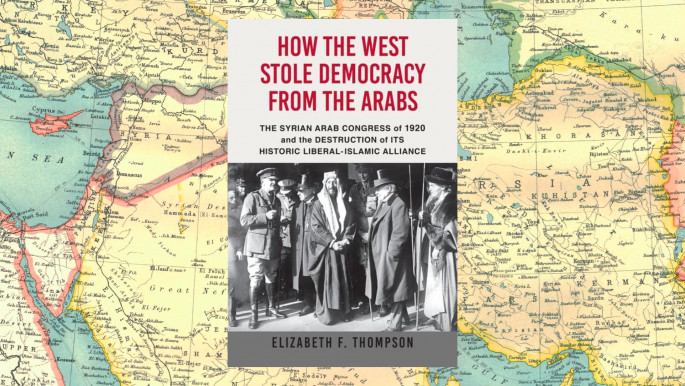The Hundred Years' War on Palestine by Rashid Khalidi
This exquisite timing was apropos. The US plan seeks to permanently subordinate the Palestinian people to Israeli domination by enabling Israel's unilateral annexation of 30 percent of the occupied Palestinian West Bank.
It also maintains Israel's control over Jerusalem, denies Palestinian refugees their right of return, denationalises Palestinian citizens of Israel, and perhaps, one day, will establish a nominally independent Palestinian Bantustan in parts of the West Bank and Gaza Strip devoid of sovereignty.
Trump's son-in-law and senior advisor wunderkind Jared Kushner bragged about reading 25 books on the Israeli-Palestinian conflict prior to writing the 'deal of the century,' which reads more like a business plan PowerPoint than a serious attempt at resolving one of the most intractable issues in international relations.
It is doubtful that any of Khalidi's previous books on Palestine made it onto Kushner's slim reading list. Nevertheless, the Trump administration's plan serves as a pertinent codicil to the thesis of Khalidi's latest book, which is that the Zionist movement and the State of Israel since 1948 have worked hand-in-glove with the superpowers of the day to impose brutal settler-colonial rule over the indigenous Palestinian people.
 |
Khalidi's book traces how the Zionist movement and the State of Israel have worked hand-in-glove with the superpowers of the day to impose settler-colonial rule over the indigenous Palestinian people |  |
In a taut, compelling, and erudite 255 pages, Khalidi paints a masterpiece overview not only of the apartheid system of rule the Zionist movement and Israel has established over the Palestinian people, but of their stubborn and resilient resistance to this system as well.
At times, Khalidi deems this resistance to be strategic and effective. The decentralised revolt against the British Mandate from 1936 to 1939, the PLO's reassertion of Palestine on the geopolitical agenda in the 1960s after it was almost consigned to oblivion in the aftermath of the Nakba, and the creative and nonviolent First Intifada of the late 1980s are marshalled as examples of the dynamism of the Palestinian people in refusing to acquiesce in plans for their dispossession.
 |
|
| Read more from TNA's Book Club: How the West Stole Democracy from the Arabs |
However, Khalidi is also scathing in his assessment of some Palestinian decision-making which further diminished the already great odds of successfully resisting a highly motivated, organised, and strategic settler-colonial movement supported by imperial powers.
The quiescent and fratricidal politics of Palestinian notables during much of the British Mandate, the PLO's entry into the Oslo "peace process", and the nihilistic attacks by all Palestinian factions against Israeli civilians during the Second Intifada of the 2000s are scrutinised and abjured by Khalidi.
The book is periodized into six 'Declarations of War' against the Palestinian people: The Balfour Declaration and ensuing British Mandate; the UN Partition Plan and its ineluctable crescendo of ethnic cleansing; Israel's occupation of the West Bank and Gaza Strip; its punishing war on Lebanon; the First Intifada and the Oslo "peace process"; and Israel's post-Camp David attempt at "politicide" of the Palestinian people, borrowing the late Israeli sociologist Baruch Kimmerling's apt term.
While Khalidi expertly demonstrates that overwhelming and brute force has been applied against the Palestinian people through Britain's smashing of the 1936-1939 Arab Revolt, the ongoing Nakba, Israel's barbaric siege of Beirut, and its inhumane blockade and repeated attacks against the Gaza Strip in recent years, he also makes the case that the diplomatic machinations against the Palestinian people have constituted seminal declarations of war as well.
 |
Khalidi paints a masterpiece overview not only of the apartheid system of rule Israel has established but also of the Palestinian people's dynamic resistance |  |
These include the Catch-22 in which Palestinians were placed by the British during the Mandate. In order to gain official recognition by the mandatory authorities and argue their right to self-determination, Palestinian representative bodies would have had to accept the terms of the Mandate as a precondition, which negated the very national rights of the indigenous population.
Ironically, the PLO walked into a similar trap three-quarters of a century later by signing the Oslo Accords, a series of lopsided agreements with Israel which Khalidi appropriately refers to as a "gilded cage." Khalidi excoriates the PLO for this "peculiar transaction, whereby a national liberation movement had obtained nominal recognition from its oppressors, without achieving liberation, by trading its own recognition of the state that had colonized its homeland and continued to occupy it. This was a resounding, historic mistake, one with grave consequences for the Palestinian people."
 |
|
| Read more from TNA's Book Club: The Beauty of Your Face by Sahar Mustafah |
Khalidi is extremely well-positioned to make this argument not only as an eminent historian, but as a participant in the negotiations which preceded the Oslo Accords as well. In the post-Gulf War Madrid Conference and subsequent bilateral negotiations in Washington, Khalidi was at first an advisor to the Palestinian delegation and later a negotiator for it.
Khalidi narrates fascinating behind-the-scenes details of the negotiations, which included proposals from the Palestinian negotiating team that could have avoided the Oslo trap of indefinite indeterminacy and perpetual occupation.
In this retelling, he is tasked with briefing the US "peace process" team on a security coordination breakthrough about which, at first, both he and the Americans are incredulous. But the breakthrough is authenticated by PLO Chair Yasser Arafat, due to Israeli Prime Minister Yitzhak Rabin's secret back-channels to him on security coordination that in turn facilitated the Oslo backchannel.
While Khalidi's book is an excellent, accessible, jargon-free overview for the uninitiated of the past century of the settler-colonial war against the Palestinian people, it is details like this that make the book an eye-opening gem for readers already intimately familiar with this history.
 |
For Khalidi, stressing the fundamental inequality between Israeli Jews and the Palestinian people is the key to mobilising public opinion in order to end the century-long settler-colonial war on the basis of justice |  |
Khalidi largely accomplishes this feat by interweaving his and his family's personal experiences with this history. He begins the book with a prescient letter sent by his cosmopolitan great-great-great-uncle, Yusuf Diya al-Din Pasha al-Khalidi, to Theodor Herzl, the founder of the modern Zionist movement in 1899. In it, Yusuf Diya argues that the fulfilment of the Zionist project would entail the dispossession of the Palestinian people, a prophecy amply borne out in Khalidi's book.
Subsequently, Khalidi and his family members appear as central figures in the history of the Palestinian people, from his uncle's position on the Arab Higher Committee during the mandate and his banishment by the British to the Seychelles Island for his political activities, to his father's ground-level position at the UN where he watched the US collude with Israel to enable it to grab more territory before a cease-fire was imposed to end the 1967 war.
 |
|
| Read more from TNA's Book Club: When We Were Arabs: A Jewish Family's Forgotten History |
It also includes his wife Mona's heroic endeavours while pregnant to keep churning out news as the editor of the English-language bulletin of the Palestinian news agency Wafa during Israel's invasion of Lebanon. It is these stories, gleaned from family documents and memoirs, oral history, and lived experiences, which enliven and enrich Khalidi's superb history.
Khalidi concludes the book by analysing the policies of the Trump administration, arguing persuasively that "for the purpose of negotiations, the Palestinians ought to treat the United States as an extension of Israel. As a superpower, it would necessarily be represented at any talks, but it should be considered as an adversarial party, even seated with Israel on the opposite side of the table, which would represent its real position at least since 1967."
For Khalidi, stressing the fundamental inequality between Israeli Jews and the Palestinian people is the key to mobilising public opinion moving forward to eventually "reopen all the crucial issues created by the 1948 war" in order to end the now more than century-long settler-colonial war against the Palestinian people on the basis of justice.
Josh Ruebner is Senior Principal at Progress Up Consulting and is the author of Israel: Democracy or Apartheid State? and Shattered Hopes: Obama's Failure to Broker Israeli-Palestinian Peace.
Follow him on Twitter: @joshruebner
The New Arab Book Club: Click on our Special Contents tab to read more book reviews and interviews with authors:
 |
|



